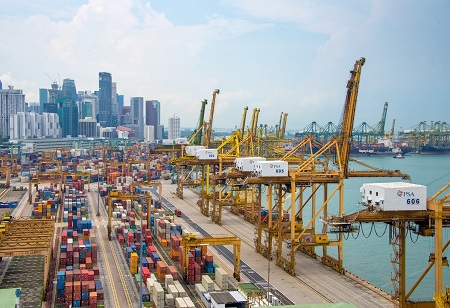
Singapore Achieves Record 3 Billion Gross Tonnage in Ship Arrivals

 The Port of Singapore experienced a festive boost, achieving a significant milestone in ship arrivals. In 2023, the Maritime and Port Authority of Singapore (MPA) reported a record-breaking volume of vessels at its terminals. The annual tonnage for vessel arrivals, indicating vessel traffic, reached a new high of slightly over 3 billion GT (gross tonnage) in 2023, marking an increase from the 2.83 billion GT recorded in 2022.
The Port of Singapore experienced a festive boost, achieving a significant milestone in ship arrivals. In 2023, the Maritime and Port Authority of Singapore (MPA) reported a record-breaking volume of vessels at its terminals. The annual tonnage for vessel arrivals, indicating vessel traffic, reached a new high of slightly over 3 billion GT (gross tonnage) in 2023, marking an increase from the 2.83 billion GT recorded in 2022.
Gross tonnage serves as a metric for gauging the dimensions of ships, encompassing the measurement of a vessel's enclosed areas such as its engine room and non-cargo spaces. On the other hand, annual vessel arrival tonnage represents the collective internal volume of all ships arriving at the port within a year. Acting Minister for Transport Chee Hong Tat credited Singapore's achievement in this milestone to the robust collaboration among unions, industry players, and the government.
“Other people may try to copy our hardware and infrastructure, they may even try to follow our technologies and operating systems. But many find it difficult to replicate our trusted tripartite ecosystem in Singapore", he said. “This is therefore one of the key elements which gives us an edge to stay ahead of the competition, and take Maritime Singapore to even greater heights".
Mr Chee was speaking at a ceremony where he also gave thanks to the Japanese shipping company Ocean Network Express (ONE). The arrival of its 98,799 GT Singapore-flagged container ship, ONE OLYMPUS, at Pasir Panjang Terminal enabled Singapore to cross the 3 billion GT milestone. “ONE's enduring ties with Singapore will continue to flourish as we recognize its leading qualities as a global maritime centre, strategic logistics hub and home to our global corporate head office", said ONE CEO Jeremy Nixon.
As the Senior Minister of State for Finance, Mr. Chee highlighted the immense significance of the 3 billion GT milestone. This achievement is particularly noteworthy considering the maritime industry's downturn in 2016 and the disruptions in the supply chain caused by the COVID-19 pandemic. Recent global events, such as escalating geopolitical tensions and military conflicts involving Russia and Ukraine, as well as Israel and Hamas, have further contributed to economic uncertainty and instability. Notably, the Israel-Hamas conflict has extended to the Red Sea, where Iran-backed Houthi rebels in Yemen are targeting ships navigating the Suez Canal with drones and missiles. They claim this action is a response to Israel's war in Gaza.
This prompted shipping giants such as Maersk to reroute ships around Africa via the Cape of Good Hope, resulting in longer sailing times and higher costs. “(Ministry of Transport) and MPA are carefully monitoring these developments and keeping in close contact with our partners and stakeholders, to see how we can work together to mitigate the disruptions", said Mr Chee. Nonetheless, Singapore is continuing to press on with the development of its next-generation container port at Tuas, while also enhancing port efficiency at existing ports, said Mr Chee.
"More efficient vessel turn-around times not only reduce carbon emissions due to shorter port stays and better voyage planning but also allows port users to benefit from cost and time savings", said Mr. Chee, adding that the initiative will be rolled out to tankers berthing at energy terminals and to all vessels calling at the anchorages in 2024. "As we have done so for previous challenges, I am confident that our port’s connectivity, efficiency, and reliability will enable Singapore to play a key role of a catch-up port, working closely with the major shipping lines to facilitate the flow of goods around the world".

